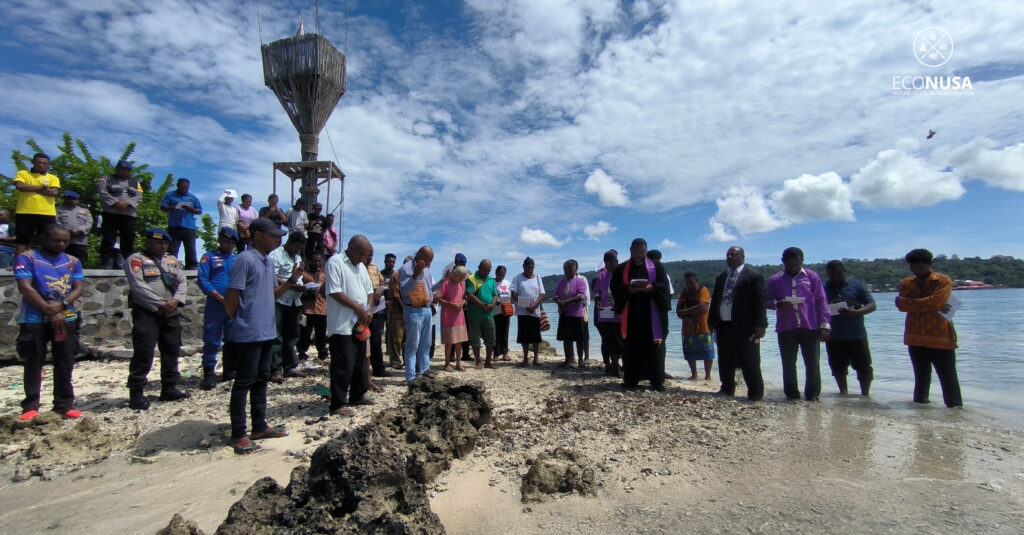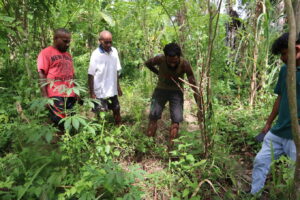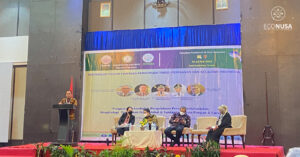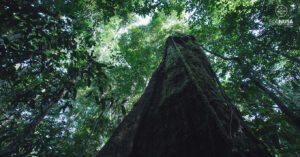
The land of Papua has rich traditions and cultures, including implementing local wisdom to protect its nature. Sasi is one of the local wisdom in the land of Papua that implements the prohibited extraction of natural resources within a mutually agreed period. This tradition was implemented in Nusmapi Island, also known as Lemon Island, which is in Tekuk Doreri, Manokwari, West Papua.
“This is the first time there is sasi in Doreri Bay. We will enforce the church’s sasi for the sea starting today for the next year,” said Plt. Head of Nusmapi Village, Musa Rumbarar, Friday, 31 March 2023.
The Manokwari EcoDefender, Karel Yambise, initiated the implementation of Sasi in Nusmapi Island after his participation in the 2022 Manokwari Youth Camp on Lemon Island which was held by the EcoDefender community and Komunitas Pecinta Alam Papua Barat (PELAMPAR) with the support of the EcoNusa Foundation. After the Youth Camp, he invited two of his friends to do research on the water area conditions on Nusmapi Island. The research showed that there was a lot of damage to both coral reefs and declining water quality. The people on the island also complained that the number of fish caught was not as much as in previous years. “But 75 percent can still be saved,” said Karel.
Read also: Sasi Sambite: Local Wisdom to Boost Nutmeg Quality in Arguni Bawah
Karel then proposed to do Sasi to the local villages to preserve their coastal and water areas, as Sasi will give time for marine resources to grow and maintain the population. At first, the community rejected the Sasi proposal because they thought this was for the benefit of other people. Karel and other EcoDefenders then tried to convey it to the management of the Utrecht Ark GKI of Nusmapi Island, the church accepted the initiative.
“Sasi is a cultural tradition, from each tribe that is carried out with traditional rituals by asking the ancestors’ spirits for blessings. The church carries out Sasi tradition by providing new values in Christianity, as a form of protecting and preserving nature as a mandate given by God,” said the Utrecht Ark GKI Priest during the Sasi closing ceremony.
In a church meeting, the people of Nusmapi Island agreed that Sasi would apply to two-thirds of the Nusmapi water areas. Communities may take marine products in areas where Sasi is not enforced or outside the Nusmapi Sea. They will enforce Sasi for a year, from 31 March 2023 and Sasi will reopen on 1 April 2024.
Read also: Sasi Nggama: A Tradition of Protecting the Sea in Kaimana
Nusmapi is an island in Doreri Bay which can be traveled by boat in about 5 minutes from Manokwari City. Nusmapi is a small island, with an area of around 6.87 hectares. We can explore the island with only a 30-minute walk. Administratively, Nusmapi was part of Mansinam Village, but since December 2022, Nusmapi officially became a separate village.
Currently, there are 56 families living on the island. Most of the people on the island work as fishermen. They look for marine products in island waters and further to the sea area of the South Manokwari Regency.
Read also: Retracting Egek, Looking at Moi Tribe’s Natural Deposit
Ima Rumbobiar, a resident of Nusmapi Island, said that he initially rejected the Sasi rule because he could no longer find fish, octopus, or bia in island coastal areas. Usually, Ima just goes down to the beach behind her house and walks around the island to catch fish and other marine products for her own consumption. With the Sasi rule, it means that she has to pay for gasoline to reach water areas where Sasi is not enforced. “Because this Sasi is for the benefit of the future, so our children and grandchildren can still experience what we have now, so I agree to the Sasi implementation,” She said.
Yoel Rumbobiar, the representative of the customary owners of Nusmapi Island, also supports the regulation and is grateful for the initiative from EcoDefender. “We have very little knowledge of marine protection, but through EcoDefender we learn that Sasi can help to preserve and protect. This is very good. We’ll see in a year how the results will be, ” he concluded.







